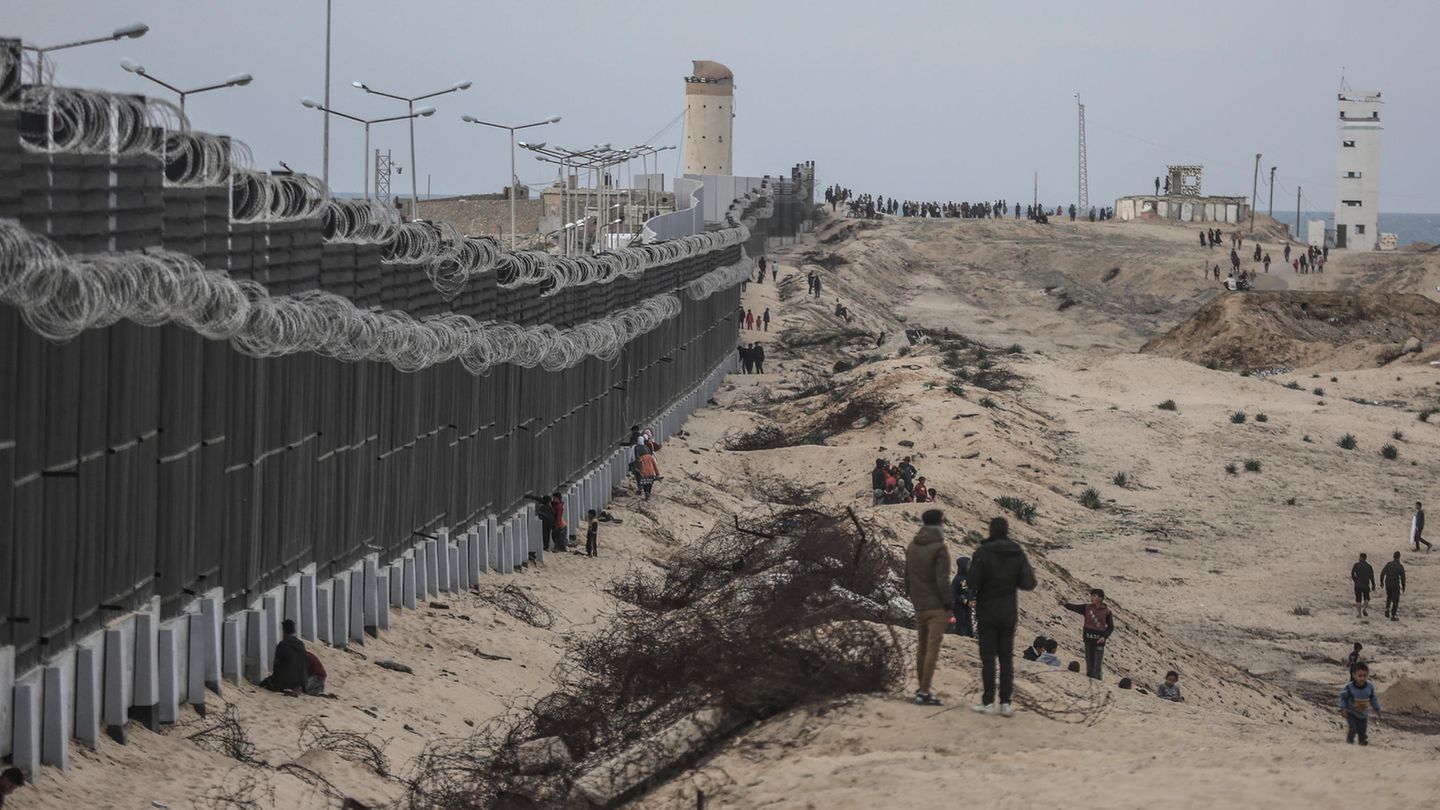Easily explained
“A supply line for Hamas”: This is what Israel’s army calls the Philadelphia Corridor between the Gaza Strip and Egypt. Now Israeli troops have brought it under control – and thereby snubbed their neighbor. The Philadelphia Corridor – simply explained.
Where is the Philadelphia Corridor?
The 14-kilometer-long and only 100-meter-wide strip of no man’s land stretches along the southern edge of the Gaza Strip along the border with Egypt. The corridor was created in 1978 as part of the Israeli-Egyptian Camp David agreement – as a security zone between the Egyptian Sinai Peninsula, which Israel occupied until 1982, and the Israeli-occupied Gaza Strip. To this day, barbed wire walls and concrete barriers line the largely undeveloped, sandy area. The name “Philadelphi” comes from an Israeli army radio code. In Arabic, the strip of land is called the “Saladin Axis” (Mihwar Salahudin) because it runs across Saladin Street, the main traffic axis from north to south through the Gaza Strip.
Why was the buffer zone created?
Originally, Israel’s army used the corridor as a patrol route to control the southern border of the Gaza Strip between the Mediterranean Sea in the west and the Egyptian-Israeli border at the Kerem Shalom crossing in the east. The aim at the time was to protect Israel against its former enemy Egypt. As part of their 1979 peace treaty, Israel and Egypt agreed to demilitarize the neighboring Egyptian Sinai Peninsula. Israel also committed itself to maximum limits on the number of soldiers and military equipment it could station in the Philadephi Corridor.
Why did Israel give up control of the border strip?
Because it is not an external border of Israel. In the course of the unilateral withdrawal of the Israeli army from the Gaza Strip and the evacuation of the Jewish settlements there in 2005, Israel’s army also withdrew from the buffer zone. In the same year, Israel and Egypt signed an agreement that allowed Egypt to station a 750-strong border force on its side of the border with the Gaza Strip, including light equipment: eight helicopters, 30 lightly armored vehicles, four patrol boats. On the Palestinian side, units of the Palestinian Authority (PA) were to ensure security along the border. But in 2007, the PA lost control of the Gaza Strip to Hamas. Since then, the Palestinian side of the border has been under the control of the Islamists.
What is the significance of the Philadelphia Corridor today?
Since 2007, Hamas has used its control of the border with Egypt to smuggle weapons into its territory through tunnels between Gaza and Egypt and to profit from taxing the movement of goods and people through the only border crossing between Egypt and the Gaza Strip in the city of Rafah. Israel has repeatedly put pressure on Egypt over the years to stop this, but with varying degrees of success. Between 2012 and 2016, Cairo cooperated with Israel, flooding tunnels and destroying thousands of homes on the Egyptian side of the border to combat smuggling.
From 2016, however, the Egyptian government sought good relations with Hamas because it needed the Islamists’ help to fight an Islamist rebellion in Sinai. At that time, Hamas severed its relations with the Egyptian Muslim Brotherhood. Israel also participated in the fight against the uprising in Sinai during this period with air strikes on rebel retreats. As Egypt and Hamas grew closer, border traffic business flourished on both sides of the border.
In 2018, Hamas and Israel signed an agreement to ease the Israeli blockade of the Gaza Strip, which permanently opened the Rafah border crossing. Since then, more and more goods have been coming into the Gaza Strip via Rafah: the share of total imports to Gaza rose from less than ten percent to 37 percent in 2023. This had two consequences: the movement of goods and people was largely beyond Israel’s control. And Hamas and the Egyptian authorities made a fortune from fees and taxes. Hamas alone is said to have earned 14 million US dollars a month from border business in Rafah.
Why has Israel now recaptured the Philadelphia Corridor?
Israel had already taken control of the Rafah border crossing weeks ago. The next part of the ongoing ground offensive in the city of Rafah was the recapture of the entire border strip with Egypt. Months ago, Israel had already announced that regaining control of the Philadelphia Corridor had been a war aim for security reasons: tunnels were to be destroyed in order to prevent the smuggling of weapons and the escape of Hamas cadres.
But Israeli politicians have also repeatedly indicated that they want to enable as many Palestinians as possible to “leave” the Gaza Strip. Many Gazans understood this as a threat to drive them across the border to Egypt. For this reason, Egypt has kept the border with the Gaza Strip closed since October 7th and has only allowed Palestinians from Gaza to enter in very small numbers and after paying horrendous fees. The government in Cairo fears that Egypt will be destabilized if millions of Palestinians come to the country – and with them Hamas cliques infiltrate the Sinai. The conditions in Jordan in the early 1970s, when Palestinian militias threatened the rule of the royal family there, and in Lebanon during the civil war in the 1980s and 1990s, which was triggered in part by the presence of Palestinian refugees and armed militiamen, are warning examples for Egypt’s government. Egypt recently increased its military presence along the Philadelphia Corridor by 40 tanks and other armored vehicles.
Does Israel’s reconquest of the area endanger the peace treaty with Egypt?
“The Philadelphia Corridor must be in our hands. No other arrangement could ensure the demilitarization (of the Gaza Strip), which is our goal,” said Israeli Prime Minister Benjamin Netanyahu at the end of 2023. Since then, official voices from Cairo have warned that a renewed Israeli occupation of the corridor would be a violation of the 45-year-old peace agreement between the two states. An Egyptian soldier died a few days ago in an exchange of fire between Egyptian and Israeli troops on the border.
Officially, the regime of General Abdel-Fattah al-Sisi views the Israeli conquest of the Philadelphia Corridor as a violation of Egyptian sovereignty. Nevertheless, Cairo is trying to calm the situation, because the heavily indebted Egypt is dependent on American military aid and international loans. But as long as Israel’s ground offensive in the southern Gaza Strip continues, there is a risk of escalation. Also because Israel has made it clear that in the fight against Hamas it is prepared to cross Cairo’s red lines.
Source: Stern
I have been working in the news industry for over 6 years, first as a reporter and now as an editor. I have covered politics extensively, and my work has appeared in major newspapers and online news outlets around the world. In addition to my writing, I also contribute regularly to 24 Hours World.




